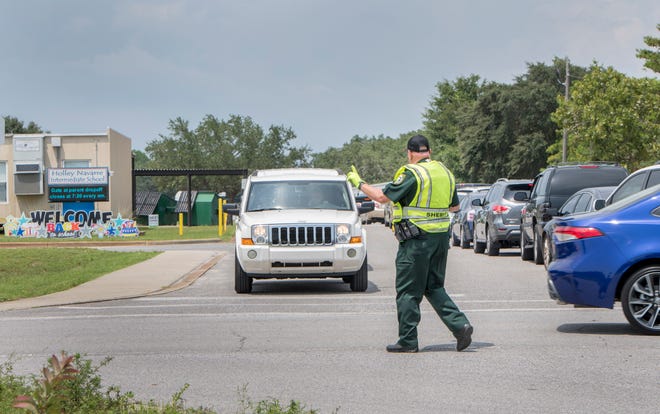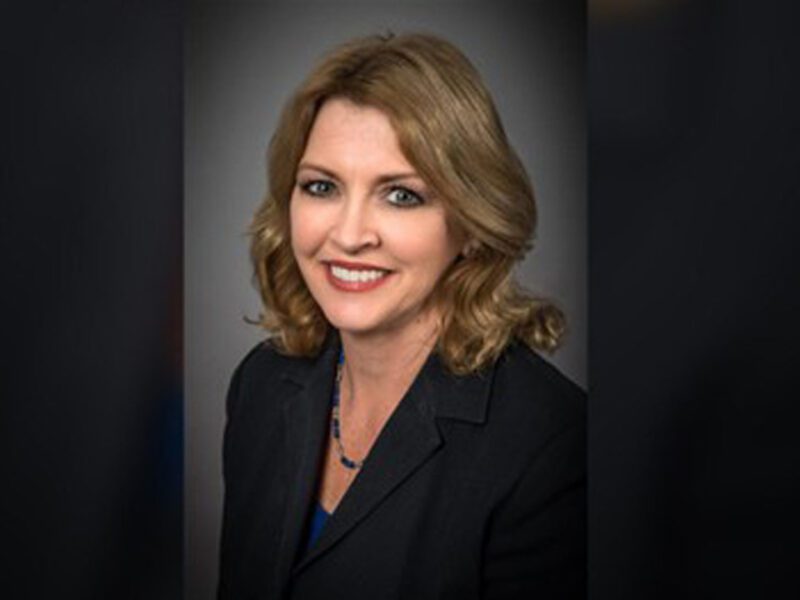Santa Rosa will fund SROs during summer; discussion spirals into Guardian program debate
Pensacola News Journal | By Annie Blanks | June 24, 2021
Santa Rosa County Commissioners agreed Tuesday to fund the salaries of school resource officers during the summer months when they’re not working in schools and are performing other public safety duties in the community.
But the decision came only after a fiery debate in which Commissioner James Calkins unsuccessfully tried to hamstring the money on the condition that the school board implement a Guardian program.
It appeared to be a simple, run-of-the-mill request: The Santa Rosa County School District has put an SRO in every one of the district’s 35 public schools since the Marjory Stoneman Douglas Act passed in 2018. The school district pays for the SROs’ salaries, and the County Commissioners paid the initial $1.5 million in capital requests, including guns, patrol cars and equipment.
Some SROs work summer school when school is out, while others do work in the community as directed by the sheriff, including traffic patrol and other general law enforcement duties. The school district asked the commission to fund 17% of its SRO deputies’ salaries during the summer, only for duties that pertain to non-school related activities.
“The school district does get some money from the state, but what they get from the state doesn’t fully fund the SRO program, so they’re using general fund monies to continue to fully fund the program,” County Administrator Dan Schebler told the News Journal on Wednesday. “They approached the county and asked if we would go back to some sort of cost-sharing for the SROs, because those 35 people aren’t in schools 12 months out of the year. Some portion of their time is breaks, and obviously over the summer, they’re just deputies and the Sheriff’s Office uses them out on patrol on the beach and in the marine unit.”
The county already fully funds the Santa Rosa County Sheriff’s Office. For the current fiscal year, the SRSO budget is about $51 million, which is almost one-third of the county’s $165.9 million budget.
If the board had denied the school board’s request Tuesday, the school board would have gone back to the SRSO and asked for a $544,000 budget increase to cover the salaries during the summer months, which means the money would have come from the county anyway. The request brought before the board Tuesday was to make it administratively more transparent and easier for the deputies to get paid, as opposed to increasing the sheriff’s overall budget.
Calkins, however, wanted to approve the funding only if the school board would implement a Guardian program. He led an almost two-hour debate among commissioners, county staff and school administrators about the merits of the Second Amendment, the Guardian program and the safety of children in schools.
“I fully support SROs, I think they’re important for our county, 100%,” Calkins said. “But one of the things that I’ve been beating the drum about is the Guardian program. … Let’s give it (the funding) to them (the school district) to help out with the SROs, but also under the string that they will implement the Guardian program in Santa Rosa County.”
Both the school district and the Sheriff’s Office, however, argued that the Guardian program and the funding for deputies shouldn’t be tied together.
“The school district, more than one time yesterday, explained that these were not additional dollars we are seeking from the BOCC to help us pay for resource officers while they are in our schools, and that undoubtedly was not understood by at least one commissioner in particular,” said Joey Harrell, the school district’s superintendent of administrative services, in an interview with the News Journal on Wednesday.
Funding request spirals into debate on Guardian program, school safety
During Tuesday’s meeting Calkins insisted the Guardian program be a condition of the funding.
Guardians are armed personnel who aid law enforcement in school shooting situations, according to the Florida Department of Education. They can be existing school employees, like teachers or coaches, who volunteer to serve in addition to their job duties, or they can be people hired specifically for the role. Guardians must undergo 144 hours of training with local law enforcement, in addition to passing psychological and drug screenings.
Guardians don’t have the same capabilities as SROs, meaning they cannot make arrests, intervene in fights or perform the duties of sworn law enforcement officers.
Out of Florida’s 67 counties, 43 currently have Guardian programs, according to FDOE. In the Panhandle, Escambia, Okaloosa and Walton counties have Guardian programs in addition to their SRO programs. Santa Rosa County does not.
“I’ve had some meetings with the superintendent and other folks, and they hem-hawed about how safe our schools is and how they’ve done this and that, and this and that, and my final question is, would all those things have stopped the gunman (at Marjory Stoneman Douglas High School) from shooting those 17 children?” Calkins said at Tuesday’s meeting, referring to the 2018 school shooting in Parkland that spawned the Guardian program. “There was no answer to that question because that (an armed coach) would have stopped the gunman.”
Calkins doubled down on his comments in an interview with the News Journal on Wednesday, saying he planned to hamstring all school district funding requests to the commission in the future on the condition that the district implements a Guardian program.
“I believe that without the Guardian program, we’re less safe than Okaloosa or Escambia County schools,” he said. “We still have the same safety as (Marjory) Stoneman Douglas, as far as our schools.”
Calkins said he would put forth a resolution at the next commission meeting encouraging the school district to implement the Guardian program.
At Tuesday’s meeting, the other commissioners said they fully supported the school board implementing a Guardian program in the future, but said it shouldn’t be tied to funding for SROs who are performing non-school district related duties during the summer months.
“I’m going to support the idea that Commissioner Calkins put forward, but I’m not going to put strings on the funding,” said District 2 Commissioner Bob Cole, who acted as chairman in the absence of Dave Piech. “But I’m not going to put strings on the funding, because I believe that decision is up to the school board and our sheriff. I will express that I feel it’s a good idea, but I’m not going to hold their feet to the fire with a $500,000 request and make it mandatory to get the request out of my verbalizing that I agree it’s a good position.”
Calkins also said during the meeting that children in the Santa Rosa County School District are “not safe” in school because of the absence of the Guardian program, which prompted Commissioner Colten Wright to interject.
“I send my daughters to school every day and I feel like they’re pretty safe. If I didn’t feel they were safe, I wouldn’t send them,” Wright said. “As someone who carries a firearm everywhere I am legally allowed to, I am a proponent of the Guardian program in theory, but if the sheriff’s department and the school board and the superintendent don’t want to participate in it, that’s within their realm. That’s what they have the authority over, not this board.”
Santa Rosa County Sheriff’s Office spokesman Sgt. Rich Aloy told the News Journal on Wednesday that the district’s schools are “absolutely safe” with the presence of well-trained SROs in each school.
Aloy said the sheriff has had ongoing discussions with the current and previous superintendents and school boards for the past three years about the possibility of adding a Guardian program in addition to the SROs.
Aloy also said the board’s funding request and the Guardian program are two separate things entirely.
“We basically have two different things being discussed as one, when they really don’t have a connection,” he said.
The school board ultimately approved the funding 3-1, with Calkins as the lone dissenter.
Image: SRSO deputy/school resource officer Lee Davis directs traffic after school at Holley-Navarre Intermediate School in Navarre on Tuesday, August 13, 2019. Gregg Pachkowski/PNJ






